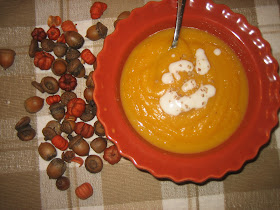 |
| One of 4 bowls filled with carrots |
 If you aren't familiar with garam masala, it is a common spice blend from India and Pakistan, and usually consists of cardamom, cinnamon, cloves, cumin, coriander, and black peppercorns. It is generally a mild, sweet seasoning, but can be spicier, depending on how much black pepper is used, which is the type I had in my cupboard.
If you aren't familiar with garam masala, it is a common spice blend from India and Pakistan, and usually consists of cardamom, cinnamon, cloves, cumin, coriander, and black peppercorns. It is generally a mild, sweet seasoning, but can be spicier, depending on how much black pepper is used, which is the type I had in my cupboard. A quick look on-line for pureed carrot soup recipes yielded one that included garam masala at the blog of Three Many Cooks. But it also used olive oil, butter, and whole milk, so I adapted it to fit my dietary needs. Rather than adding milk or cream at the end, I swirled in plain goat yogurt and found that it was the perfect compliment to the flavors. You could use any type of plain yogurt that you enjoy. I made only a half-batch of the soup, as I often do when creating something new, but was sorry that I hadn't made a whole batch because I will quickly deplete what remains!
Ingredients:
2 Tablespoons coconut oil
1 cup chopped yellow onion
1 1/2 lbs carrots, cut into approximate 1" slices (about 5 cups)
2 teaspoons sugar
3 large garlic cloves, thickly sliced
2 Tablespoons garam masala (If you are unaccustomed with this spice, you might want to use less.)
3 cups chicken broth
Salt and pepper to taste (I didn't add either)
Preparation:
Heat oil over medium-high heat in a large deep saute pan. Add carrots and then onions; saute, stirring very little at first and more frequently at the end, until vegetables start to turn golden brown, 7 - 8 minutes. Reduce heat to low and add sugar and garlic; continue to cook until all vegetables are a rich caramel color, about 10 minutes longer. Add garam masala; continue to saute until fragrant, 30 seconds to a minute more.
 |
| Simmering carrots with garam masala |
 |
| Soup without the yogurt |
Nutrition per serving:
Servings per recipe: 4
Serving Size: 1 cup
Calories: 156
Total Fat: 7 g
Cholesterol: 0 mg
Sodium: 153 mg
Total Carbs: 21 g
Dietary Fiber: 5
Protein: 3 g
















